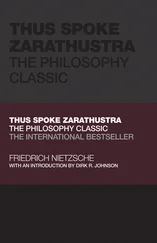Chapter LIV. The Three Evil Things.
Nietzsche is here completely in his element. Three things hitherto best–cursed and most calumniated on earth, are brought forward to be weighed. Voluptuousness, thirst of power, and selfishness,—the three forces in humanity which Christianity has done most to garble and besmirch,—Nietzsche endeavours to reinstate in their former places of honour. Voluptuousness, or sensual pleasure, is a dangerous thing to discuss nowadays. If we mention it with favour we may be regarded, however unjustly, as the advocate of savages, satyrs, and pure sensuality. If we condemn it, we either go over to the Puritans or we join those who are wont to come to table with no edge to their appetites and who therefore grumble at all good fare. There can be no doubt that the value of healthy innocent voluptuousness, like the value of health itself, must have been greatly discounted by all those who, resenting their inability to partake of this world's goods, cried like St Paul: "I would that all men were even as I myself." Now Nietzsche's philosophy might be called an attempt at giving back to healthy and normal men innocence and a clean conscience in their desires—NOT to applaud the vulgar sensualists who respond to every stimulus and whose passions are out of hand; not to tell the mean, selfish individual, whose selfishness is a pollution (see Aphorism 33, "Twilight of the Idols"), that he is right, nor to assure the weak, the sick, and the crippled, that the thirst of power, which they gratify by exploiting the happier and healthier individuals, is justified;—but to save the clean healthy man from the values of those around him, who look at everything through the mud that is in their own bodies,—to give him, and him alone, a clean conscience in his manhood and the desires of his manhood. "Do I counsel you to slay your instincts? I counsel to innocence in your instincts." In verse 7 of the second paragraph (as in verse I of paragraph 19 in "The Old and New Tables") Nietzsche gives us a reason for his occasional obscurity (see also verses 3 to 7 of "Poets"). As I have already pointed out, his philosophy is quite esoteric. It can serve no purpose with the ordinary, mediocre type of man. I, personally, can no longer have any doubt that Nietzsche's only object, in that part of his philosophy where he bids his friends stand "Beyond Good and Evil" with him, was to save higher men, whose growth and scope might be limited by the too strict observance of modern values from foundering on the rocks of a "Compromise" between their own genius and traditional conventions. The only possible way in which the great man can achieve greatness is by means of exceptional freedom—the freedom which assists him in experiencing HIMSELF. Verses 20 to 30 afford an excellent supplement to Nietzsche's description of the attitude of the noble type towards the slaves in Aphorism 260 of the work "Beyond Good and Evil" (see also Note B.)
Chapter LV. The Spirit of Gravity.
(See Note on Chapter XLVI.) In Part II. of this discourse we meet with a doctrine not touched upon hitherto, save indirectly;—I refer to the doctrine of self–love. We should try to understand this perfectly before proceeding; for it is precisely views of this sort which, after having been cut out of the original context, are repeated far and wide as internal evidence proving the general unsoundness of Nietzsche's philosophy. Already in the last of the "Thoughts out of Season" Nietzsche speaks as follows about modern men: "…these modern creatures wish rather to be hunted down, wounded and torn to shreds, than to live alone with themselves in solitary calm. Alone with oneself!—this thought terrifies the modern soul; it is his one anxiety, his one ghastly fear" (English Edition, page 141). In his feverish scurry to find entertainment and diversion, whether in a novel, a newspaper, or a play, the modern man condemns his own age utterly; for he shows that in his heart of hearts he despises himself. One cannot change a condition of this sort in a day; to become endurable to oneself an inner transformation is necessary. Too long have we lost ourselves in our friends and entertainments to be able to find ourselves so soon at another's bidding. "And verily, it is no commandment for to–day and to–morrow to LEARN to love oneself. Rather is it of all arts the finest, subtlest, last, and patientest."
In the last verse Nietzsche challenges us to show that our way is the right way. In his teaching he does not coerce us, nor does he overpersuade; he simply says: "I am a law only for mine own, I am not a law for all. This—is now MY way,—where is yours?"
Chapter LVI. Old and New Tables. Par. 2.
Nietzsche himself declares this to be the most decisive portion of the whole of "Thus Spake Zarathustra". It is a sort of epitome of his leading doctrines. In verse 12 of the second paragraph, we learn how he himself would fain have abandoned the poetical method of expression had he not known only too well that the only chance a new doctrine has of surviving, nowadays, depends upon its being given to the world in some kind of art–form. Just as prophets, centuries ago, often had to have recourse to the mask of madness in order to mitigate the hatred of those who did not and could not see as they did; so, to–day, the struggle for existence among opinions and values is so great, that an art–form is practically the only garb in which a new philosophy can dare to introduce itself to us.
Pars. 3 and 4.
Many of the paragraphs will be found to be merely reminiscent of former discourses. For instance, par. 3 recalls "Redemption". The last verse of par. 4 is important. Freedom which, as I have pointed out before, Nietzsche considered a dangerous acquisition in inexperienced or unworthy hands, here receives its death–blow as a general desideratum. In the first Part we read under "The Way of the Creating One", that freedom as an end in itself does not concern Zarathustra at all. He says there: "Free from what? What doth that matter to Zarathustra? Clearly, however, shall thine eye answer me: free FOR WHAT?" And in "The Bedwarfing Virtue": "Ah that ye understood my word: 'Do ever what ye will—but first be such as CAN WILL.'"
Par. 5.
Here we have a description of the kind of altruism Nietzsche exacted from higher men. It is really a comment upon "The Bestowing Virtue" (see Note on Chapter XXII.).
Par. 6.
This refers, of course, to the reception pioneers of Nietzsche's stamp meet with at the hands of their contemporaries.
Par. 8.
Nietzsche teaches that nothing is stable,—not even values,—not even the concepts good and evil. He likens life unto a stream. But foot–bridges and railings span the stream, and they seem to stand firm. Many will be reminded of good and evil when they look upon these structures; for thus these same values stand over the stream of life, and life flows on beneath them and leaves them standing. When, however, winter comes and the stream gets frozen, many inquire: "Should not everything—STAND STILL? Fundamentally everything standeth still." But soon the spring cometh and with it the thaw–wind. It breaks the ice, and the ice breaks down the foot–bridges and railings, whereupon everything is swept away. This state of affairs, according to Nietzsche, has now been reached. "Oh, my brethren, is not everything AT PRESENT IN FLUX? Have not all railings and foot–bridges fallen into the water? Who would still HOLD ON to 'good' and 'evil'?"
Par. 9.
This is complementary to the first three verses of par. 2.
Par. 10.
So far, this is perhaps the most important paragraph. It is a protest against reading a moral order of things in life. "Life is something essentially immoral!" Nietzsche tells us in the introduction to the "Birth of Tragedy". Even to call life "activity," or to define it further as "the continuous adjustment of internal relations to external relations," as Spencer has it, Nietzsche characterises as a "democratic idiosyncracy." He says to define it in this way, "is to mistake the true nature and function of life, which is Will to Power…Life is ESSENTIALLY appropriation, injury, conquest of the strange and weak, suppression, severity, obtrusion of its own forms, incorporation and at least, putting it mildest, exploitation." Adaptation is merely a secondary activity, a mere re–activity (see Note on Chapter LVII.).
Читать дальше











